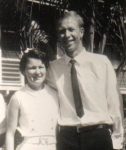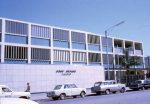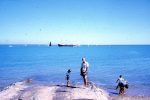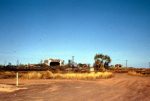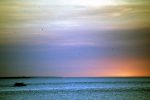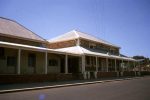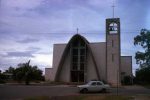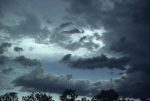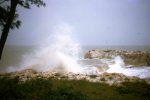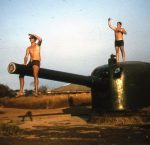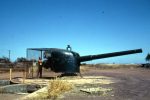I spent my first night in Darwin on Mindil Beach. It was a warm, balmy night and after having something to eat at Rocky’s Place, next to the Kerry Manolas Pharmacy in Mitchell Street, I caught a cab down to the beach area. There had been a tropical downpour during the day while we were all in the pub and I watched as the water fell in sheets and then stopped abruptly. An hour later the streets were dry again. So figuring that it should not rain again and seeing that there was no accommodation to be had, except hotels (for which I had no money), I had made for Mindil Beach. A very warm breeze wafted along the foreshore and the small tropical waves of the outer edges of Darwin Harbour broke gently on the beach. Lighting flashed around in the distance but I went to sleep on a blanket as I snuggled a position into the sand.
At around four in the morning I was awakened by a droning sound and puzzled as to what it was. I was soon to find out! The rain hit me with such force that I was wet right through instantly. The droning sound had been the rain on roofs of houses at Myilli Point. The rain drops were so hard that they were stinging and I sought relief from them in the sea. The sea was warm, probably close on 30 degrees, as I waded out to get on to deeper water. In the illumination of a remote lightning flash I saw a huge Manta Ray take off in front of me, leaping out of the water and diving again with a splash. Thinking of sharks and things that swim around in the night I beat a hasty retreat to my soggy bedding and sat the rain out. The storm passed and suddenly I was cold. But there was nowhere to go. By the time daylight broke I had dried out and once the sun was up I was soon warm again.
I made my way back up to Darwin town centre and had a cup of coffee at Rocky’s Place where all the international travellers met. It soon occurred to me that my ‘swag’ was too cumbersome to lug around and I sold it to a French tourist who was going south. This included some winter clothes, which were of no value in the tropics as by now I was going to stay here for a while. I bought a small case at the Salvation Army store and kept minimal clothes in it. A pair of socks, some underpants, a couple of singlets, a shirt, two pairs of shorts, a pair of jeans and a jumper for when the temperature dropped at night. Footwear was a pair of rubber thongs. I went down to the ANZ Bank and opened a passbook bank account and deposited nine hundred dollars in it. That was the balance of what was left after costs incurred for fuel to Darwin. Later that morning I met Michael, the American, who had given me the ride from Three Ways. He could not stand the humidity and was selling his Landrover and was flying out back to Sydney the following day.
Life in Darwin in 1969 was busy. The theme of the day was to get in to the ‘Hot and Cold’ Bar of the Darwin Hotel as soon as it opened. This was the general meeting place but if one stayed too long one started getting the shivers as the airconditioning units were running at maximum coolness. Those who stayed on for hours were always checked by the bouncer, Eddie Cubillo, who meted out rough justice to those who did not comply with ‘regulations’. There wasn’t much work to be had as we all queued at the CES office in Mitchell Street for day work. Married men got preference over single men and bush work was minimal. Many European immigrants with little English just wanted ‘bush’ work. This was mainly centred at Gove Peninsula where the Bauxite Mine was operating. Once there you were obliged to work for three months at a time and then have two weeks off in Darwin on a fly in fly out basis. Work was in 12 hour shifts around the clock. If you didn’t get caught up in gambling or excessive drinking you could save a small fortune as the wages were pretty good.
Unemployment benefits were virtually unheard of and it only paid $16 per week if you were entitled to it. As I was not an Australian Citizen I was not entitled to any benefits and had to rely on my own resources. I still had some money in the bank and was not worried about the future. Talking to various travellers I got the impression that one could live like royalty on the Island of Bali in Indonesia. I made some enquiries but soon found out that bearers of South African passports were not welcome in Indonesia. I made further discreet enquiries and found a bloke who could do quite good forgeries of passports. With this avenue in mind I set about to find someone who was prepared to sell their passport. I found an Australian passport for $100. This was top dollar in 1969. I then had passport photos taken and handed all to the forger together with $25 down payment and $25 payment on completion. After a few days I got the passport back . It was not a good copy but would have sufficed. Now that I had a way out of Darwin leaving became less important and I was soon to get a job.
I worked as a Plaster Caster’s assistant for a builder by the name of Roy Graetz. We would mix the plaster up in cement mixers and then pour it on to tables which looked like converted billiard tables. It would be given time to set and then picked up with clamps and put outside to dry in the sun. My next job was unloading cement from the railway yard and that was hard yakka. Then I did a few labouring jobs around the place. In the mean time I slept on Lameroo Beach with all the other hippies and some blackfellas. Everyone except me was smoking hashish. If you stood at the top of the pindan cliffs which rose above the beach, you could smell the aroma of dope wafting up on the air currents. I couldn’t stand the smell of it. I stuck to Benson and Hedges or Marlboro with an occasional Camel thrown in. Some days when there was no work I would be down on the beach playing cards 21 or Vantoon or Pontoon as the blackfellas called it. They were great card players and didn’t mind losing now and then. In the afternoons we would all traipse up to the ‘Hot and Cold’ to have a few beers. Some nights the Police would come down to the beach to harass us. We would all get up and walk down to the waters edge with our bedding. This was and as far as I know still is No Mans Land between the High water and Low water mark. Then the cops would just laugh and go back up the steps to their vehicle. One night they shone a torch in my face and asked me for identification. I showed them my passport and also told them I had a job. They wanted to know why I was staying on the beach. I asked “Where is the accommodation?” There was no accommodation to be had except isolated boarding houses, which were full. After a while we were left in peace. When it rained we all sat under a tarpaulin that some one had knocked off from the railway yards. This tarp was heavy duty and completely waterproof. We eventually rigged up a lean-to which we could prop up when the skies opened up.
Then as the dry season approached the beach campers moved off as they were either wending their way north through Asia or flying home to wherever. I was left to my own devices and decided to try and take the mesh screen off the old bathing cubicle which stood on a concrete block at the bottom of the walkway. To my surprise it came off easily. I then managed to open the door as was able to make use of the space inside. I could sleep fully stretched out on the floor and there were still some old steel pegs where I could hang my clothes on. One night I met a young aboriginal girl from out of town who had nowhere to stay and I invited her down to share my pad. She brought her swag roll with her and it was a lot softer than my meagre blankets.
One Saturday afternoon in the public bar of the Smith Street Hotel I bumped in to Croatian Frank, my protagonist of the Stuart Highway. He and his mates were drunk again and he grabbed me by the arm as I walked past his table. “Hey man” he said, “I am gonna fight you this time”. And with that he and his mates got up. At that precise moment Frank suddenly rose up above me as if he was floating upwards. He tried to wriggle and his eyes grew wider as he kept on rising off the ground. Perplexed he shouted, “What the fuck!” It was my mate Petro Kowalski, the Pole. He was six foot eight inches in height, and muscular. I had done him a favour one day, explaining some details he couldn’t understand at the CES and he was for ever grateful towards me. He knew Frank from another incident. He had been drinking by the bar when he saw me walk past Frank’s table and the saga unfold. He strolled over and picked Frank up by the scruff of his neck and with one hand lifted him off the ground. “You leave my mate alone, OK?” said Kowalski. Frank said nothing except trying to wriggle free. So Kowalski lifted him higher. “Understand?” he said again softly. Frank nodded. Kowalski let him down. “Now you shake hands” he told Frank. Very reluctantly Frank shook hands with me. “Good,” said Kowalski, “Now you leave my friend alone or I will fix you.” Frank nodded again. Every time after that when I bumped in to Frank he would say “Hello, you’re Kolwalski’s mate, hey?” and leave it at that.
I landed a job with a construction and shipping company down at Stokes Hill wharf doing a variety of jobs. The owner was a bloke of Yugoslav descent and had quite friendly disposition and I was given lots of little jobs to do. Then he won a large contract to build three Tallow Tanks which were to be situated behind the RAOB Club and assigned me to work there. These tanks came in sections and it was a pretty simple procedure to bolt them all together but it needed another three blokes. Here I met a Pom, a Brazilian and an Irishman. This also led to all of us renting a 36foot caravan down at Joe’s Place together with two Americans Joe was a diminutive Greek bloke who had a block of land next to the railway yards. Here he installed some very roughshod and basic toilets and showers and brought in six large caravans. It cost ten dollars a week to rent a bed per person and so Joe had around 24 blokes living on the premises at any given time. So he was coining it by 1969 standards but also provided much needed accommodation. Girls were not allowed to live with anyone or in any of the vans but there were a constant stream of females from caravans especially late at night or early mornings.
The tank job took us a month to complete. The down side of the job was that we got severely sunburned in the process due to the highly reflective nature of the metal sheeting. I went and bought a lightweight long sleeved shirt and a similar pair of trousers to beat off the reflective rays. The Brazilian bloke wore a sarong which was something that he would wear in his country. I had never seen sarongs and wasn’t keen to try one out anyway. Later I was to learn that they were and essential piece of garment in Indonesia and the rest of Asia.
We completed the job at the end of May and I was told by the boss that my services were no longer needed. He gave me a cheque and sent me on my way. I had been paid in cash up till then but did not worry about it. When I went to cash the cheque however I was in for a surprise. The bank said that there were no funds in the account. So I went back to the company and then suddenly I couldn’t get to see the boss. His secretary told me that I would have to come back the following week to sort the cheque out. It was Friday after lunch and I needed the money to pay my rent. There was no getting past the secretary who became a trifle aggravated at my persistence. Seeing as I was getting nowhere I left and walked up the hill to the Police Station in Mitchell Street. A very sympathetic Sergeant said that he would sort this bloke out for me and so we got in a Police car and went down to the wharf. Seeing a policeman with me the secretary quivered and promptly let us in to the boss’s office. The sergeant explained that it was against the law to issue a wages cheque if there were no funds available. The Yugoslav bloke looked frightened and quickly rummaged in his safe and found the money. The Sergeant and I left and laughed at the incident and I offered to shout him a couple of beers after work, but he refused, saying that he was only too glad that he could help.
The following evening, Bruce, one of the Americans who lived in the caravan, invited us all to come along to a dance. All the others had something to do and as I was at a loose end, I accepted. We walked up town and caught a cab. Bruce had a date with a girl, whom he had met somewhere, and we picked her up along the way. Down to the pub we went for copious amounts of beer and later in the evening we had meal at a restaurant. Then it was down to the Fannie Bay Hotel for Late Night dance. Every Wednesday, Friday and Saturday evenings certain pubs were allowed to extend their trading beyond the official 10pm closing time until 11.30pm. We danced and generally enjoyed ourselves at the Fannie Bay Hotel and I met a friendly girl with whom I made a date for the following Sunday. Bruce’s date, Judith, was a bit unimpressed with both of us, and let us know that fact when we dropped her off at her boarding house.
The week wore on and I picked up a bit of labouring work down at the wharf. Come Sunday morning and I met up with my mate Danny at Rocky’s Place for a morning cuppa. He was a drug addict and was in a bad way shivering from withdrawal symptoms and needing a fix. He was broke, however, and so I helped him out. He needed twenty dollars and would pay me back later. I said that I would give him the money for him to keep as long as he lent me his car for the day. He agreed. I gave him the money and he went off to buy his drugs. Danny returned about an hour later quite calm and talkative and handed me the keys to his 1958 Morris Isis.
I set off in the old car down to the boarding house where I was to meet my date, which I had arranged the previous weekend. My date however had developed cold feet and was nowhere to be found. Fellow boarders said that she had gone away for the weekend. I had been stood up. Now what was I to do? I had the car for the day, money in my pocket. Then I remembered Bruce’s date of the Saturday night before. Now where did she live again? I wracked my brain and finally decided the house was somewhere in Packard Street. So I drove there and asked a local who was mowing his lawns if there was a boarding house nearby. He pointed me in the right direction.
I knocked on the door and when a smallish girl answered I hesitantly asked if Judith lived there. She said yes and went to fetch Judith who was still asleep at ten o’clock in the morning. I said, “Hi, remember me? I was wondering if you would like to come out for a drive down to the beach ?'” Judith said ‘Yes, OK, but only after I have had a shower and breakfast.”
We got away on the drive by eleven thirty and drove all around Darwin looking at the sights and finally driving down on to Casuarina Beach across a small sand bar. The beach was firm and hard and we drove down for quite a distance. We seemed to get on very well and talked about many things. On the way back I drove back from the waters edge a bit and hit soft sand patch and bogged the old Morris. Then we had a good laugh and let some air out of the tyres. We also had to dig some sand away and just as we thought that we had one enough another car came along and gave us a tow out of our predicament. We made it back across the sandbar and on to firm ground again. Then we drove around to East Point and looked at the World War Two gun emplacements. We ended our drive down at Doctors Gully were we sat on the rocks discussing the virtues of hermit crabs. The two of us seemed to have a lot in common and were liking each others company and by that evening I had asked Judith if she would marry me. She agreed and we were married on the 28th day of June 1969 in Darwin. The wedding feast was something else, but that is another story.

